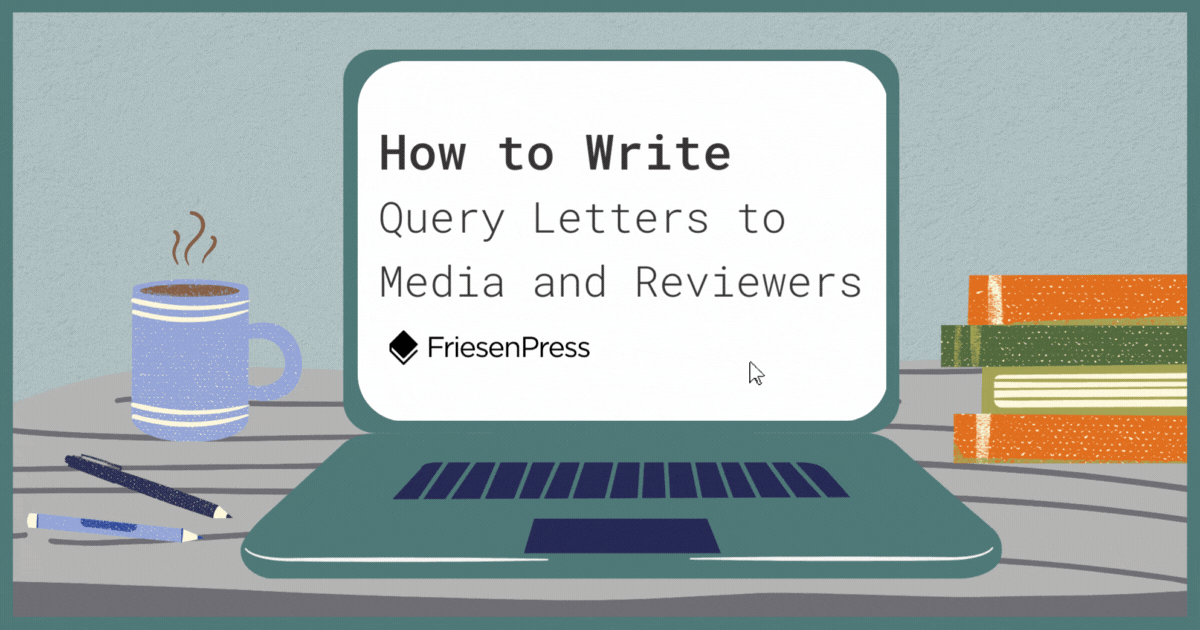How to Write the Best Query Letter to Media and Reviewers (with Templates!)
/If you have a book coming out or one that’s been recently published, you’ll need to get comfortable with sending queries. Query letters are professional requests for businesses, media outlets, and reviewers to consider working with you.
There’s more to them than just asking nicely, so in this post, we’ll go over the crucial elements to include in your query letters. We’ll even include handy templates to get you started. Let’s dive in!
Housekeeping
You’d be surprised how many people address their queries to the wrong person, spell an addressee’s name wrong, or leave in [MEDIA PERSON] when they forget to fill out their template. One way to avoid missing the customizable elements of your query letter is to mark them in a hard-to-miss way, such as in ALL CAPS or by highlighting them.
By curating your query’s core — the hook, the book, and the cook — you’ll be able to efficiently adjust the housekeeping details to customize your letter for each recipient.
First, address your letter with precision. When you find an organization you want to query, actively seek out the correct contact person, not “To Whom It May Concern.” Your contact might be a celebrity’s agent or manager, a news outlet’s Local News reporter, or a reviewer’s name as shown on their website.
If you have a personal connection, use it. “We spoke at the writer’s convention on January 3,” or “Your colleague, Dean, recommended I contact you directly about…” You can also appeal to their work and why you think that your values or brands align. Don’t say things like, “You reviewed a fantasy book last month on your blog, and I wrote a fantasy novel” — make it specific. “I really enjoyed your review of Chelsea Abdullah’s The Stardust Thief in December. I’ve written an Arabic-inspired YA fantasy based on the tales of Scheherazade, so I’d love to secure your review of my novel, [TITLE].”
These personal introductions should be brief (one to three sentences). Don’t waste time with empty platitudes or generic appeals. However, if you don’t have a personal connection, it’s best to dive right into your hook.
The Hook
A good query letter needs appeal. You’re likely sending a request to someone who is not only busy, but receives lots of other letters like yours. To make your query stand out, open with a strong “hook.” This is a brief (ideally one-sentence) blurb that hints at what your book is about — presented in a memorable and intriguing way.
For example: “Amidst the racial inequality of 1930s American South, a White lawyer risks his reputation and life to seek justice for a Black victim of sexual assault.”
Did you guess this was Harper Lee’s To Kill a Mockingbird?
This hook gives us:
a sense of the setting (1930s American South),
the protagonist (a White lawyer),
the stakes (risks his reputation and life to seek justice),
and the context (racial inequality endangering a Black client).
However, it doesn’t spoil the ending or get into the details. Technically, the narrator is Scout, not Atticus Finch, but for the sake of an effective hook, it’s important to distill down to the core elements that make the story special.
Or, if you’ve already received some reviews or testimonials, share a sentence quoting one or two of the best you’ve received so far. If you’ve had previous media spots, let them know when and where you were featured. It’s easier to get further spots once that ball is rolling.
Once you’ve grabbed their attention, tell them about your book and what you hope to achieve with this partnership.
The Book
When talking about your book, give a brief synopsis, similar to your back cover copy’s ‘About the Book’ blurb. You’ll want to define what kind of book it is, who it’s for, and what sets it apart from other books in the market. Why should they take time with your book rather than another one?
If you’re writing nonfiction, this could be because of recent news items that pertain to your subject matter. It could be because you’re an award-winning or well-educated author with clear expertise in your topic. It could also be because the audience you’re targeting matches the audience of the media outlet or blog you’re contacting.
If you’re writing fiction, you’ll want to indicate why your book will appeal to their target audience. This can be done by providing “comp titles”: titles of comparative books, movies, or series. A psychological speculative thriller might be pitched as, “For fans of Gone Girl and Orphan Black.” You’ll also want to give a slightly more explanatory snapshot of your protagonist, stakes, and conflict.
Using To Kill a Mockingbird again, this might look like:
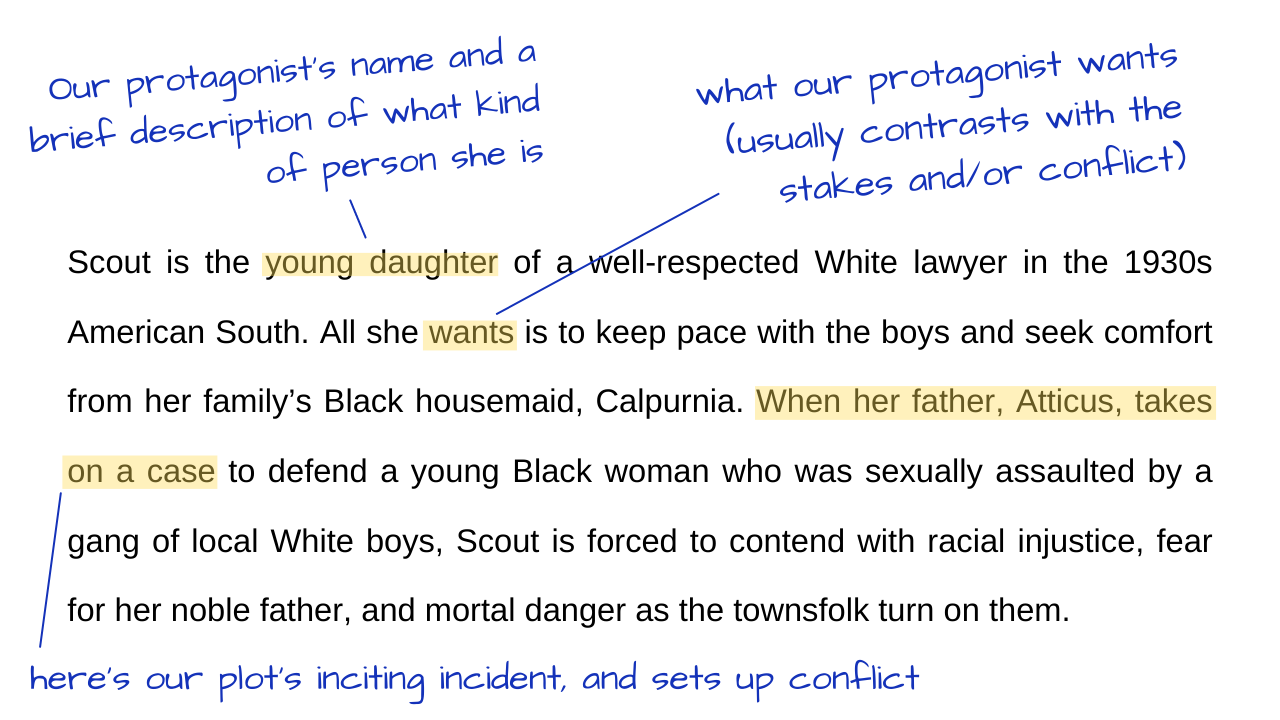
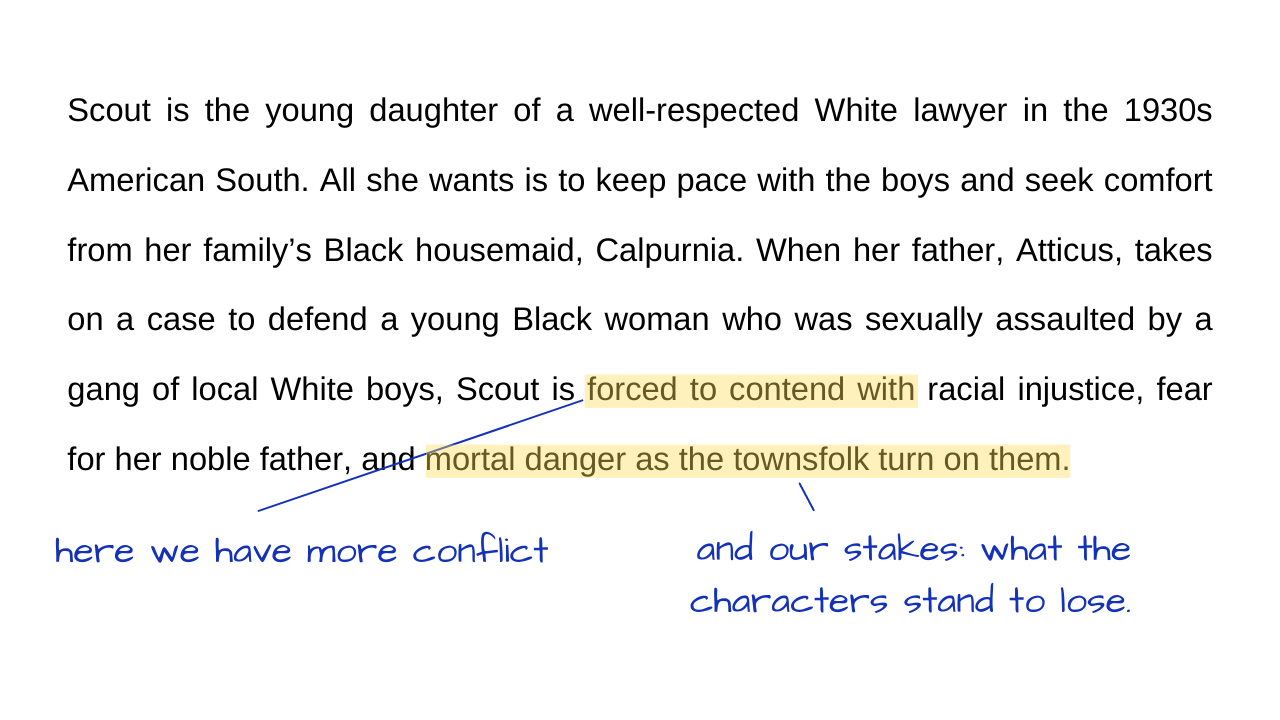
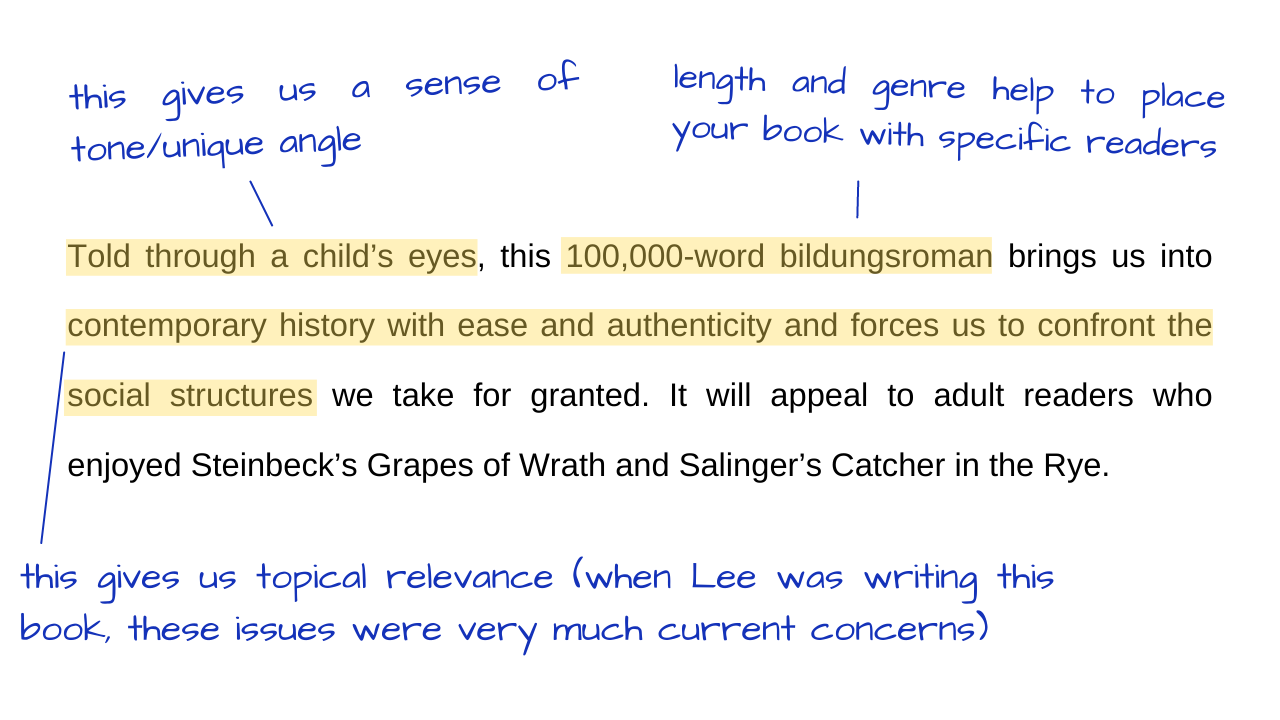
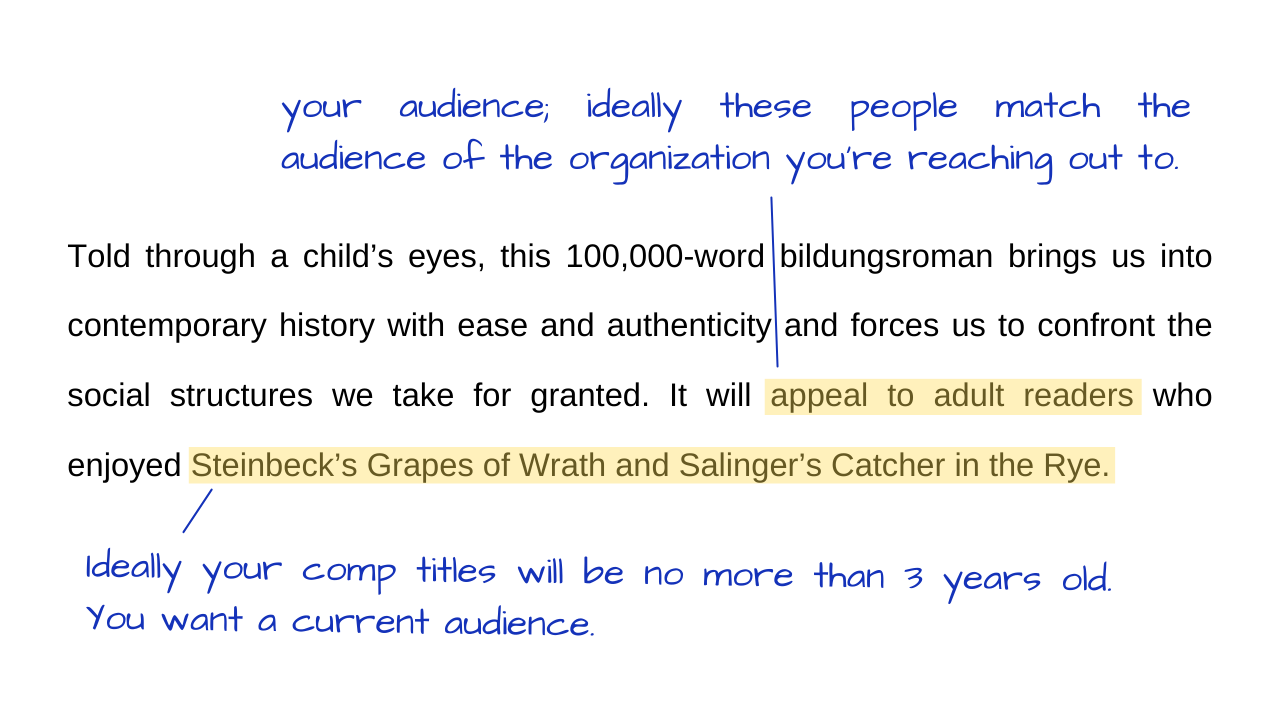
Let them know when the book will be available (or that it is, if already published) through most major online retailers to buy. Share the page count and ISBN numbers; if attaching a media kit these last two details can be left out of your query.
Once you’ve given a one to two paragraph glimpse into the kind of book you’re promoting, talk a bit about how it fits into the needs of the person you’re contacting. After all, their interview, review, or promotion helps you; how can covering your book help them? If you have a big following on social media, mention it. If you’ve got a book tour coming up in their area, mention that. If you have advertisements or other promotions underway (like offering free copies of the eBook to a certain number of their readers), pitch your proposal.
The Cook
Finally, who are you? If you’re already a big name, you might include this section before the book section, as the big selling feature will be your recognizability to potential readers/viewers. If not, now’s your chance to tell them why you’re an interesting (and professional) author to work with.
If you have any relevant degrees, awards, or expertise, you can mention these details here. You can also mention the titles of previous books, articles or papers, or other publications you may have under your belt. If there are more than three, eschew titles in favour of an impressive total, for example, “author of more than 30 articles in leading medical journals, including North American Journal of Medicine and Science.” If you don’t have any dazzling accreditations, don’t fret, you can make quieter achievements sparkle with the right approach. For instance, if you wrote a children’s book about hamsters, you could say, “A lifelong hamster caretaker, my current horde includes D’Artagnan, Athos, and Aramis, who all oversaw the writing of this book to ensure authenticity.”
Finally, you can let the recipient know how they can best reach you, whether your request is time sensitive (such as if it coincides with planned events), and any last important details to draw their attention to, such as offering to provide an ARC (Advanced Reader Copy) for their ease of review.
Then thank them for their time and sign off. Include your contact information again in your signature (ideally your website address and any relevant social media handles).
If you get approval to move ahead, great! If they decline, stay polite. In both cases, thank them again for their time before crafting any further reply.
Got all that? No worries. We’ve put together two downloadable templates, one for fiction and one for nonfiction to help you get started on an effective query. Click the button below for your copy:
If you need any support with building a plan for your promotions, or would like one-on-one coaching for reaching out to media outlets or reviewers, you can connect with our book promotions specialists.
Astra Crompton (she/they) is an eclectic writer, editor, and illustrator with over twenty-five years of publishing experience. Her work has been published in anthologies, table-top RPG books, magazines, and in several novels. They have also successfully completed NaNoWriMo six times and counting. Astra is currently the Editing & Illustrations Coordinator at FriesenPress, where they manage, coordinate, and vet FriesenPress’s industry-leading editing and illustrations teams.


